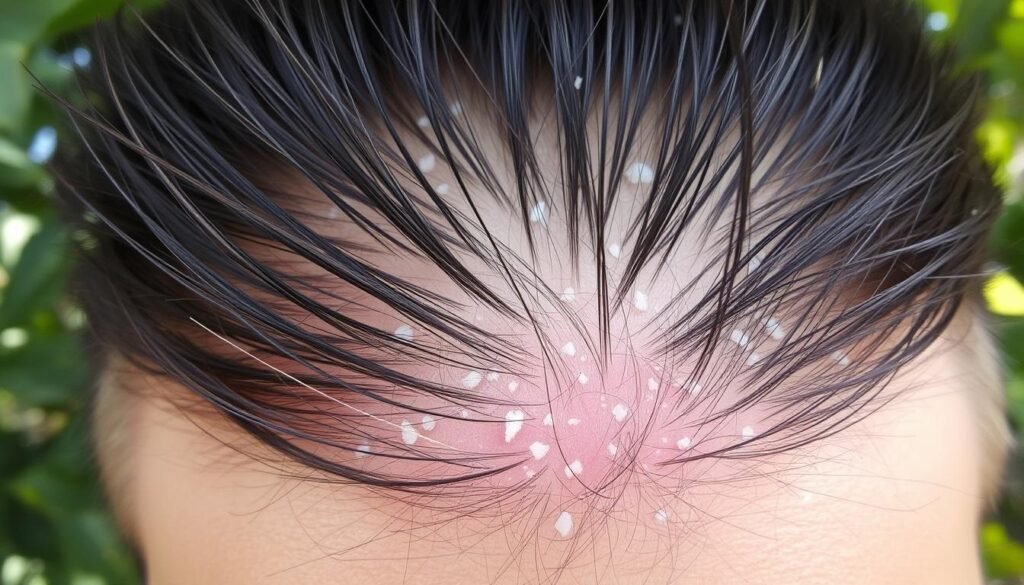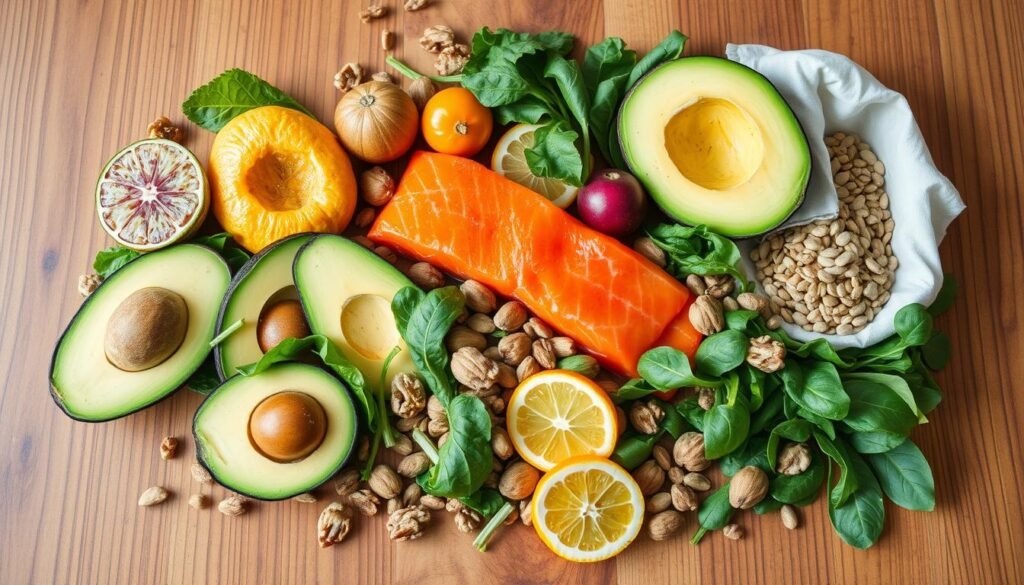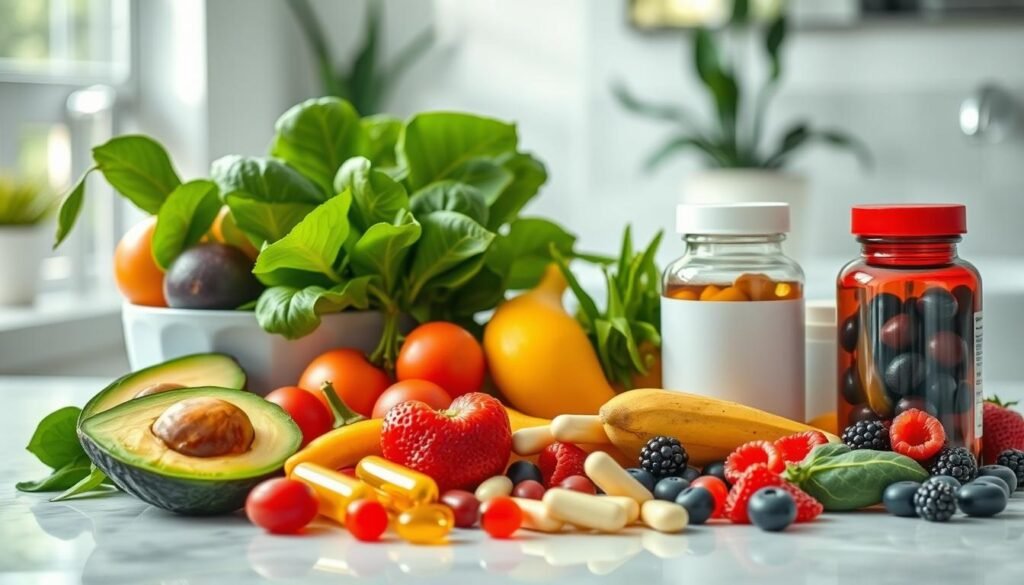Did you know 72% of people with severe scalp problems blame their diet? This fact shows how important food choices are for scalp health. It highlights the link between what we eat and fighting dandruff. A diet that cares for your scalp can really improve your hair and skin, giving the nutrients needed to fight flakes. Studies are connecting diet and dandruff more each day. Adding healthier food options into your meals can make a big difference.
Eating less processed foods and sugar is key. Add plenty of fruits, veggies, and good fats to your diet instead. These changes help directly with dandruff symptoms and also tackle lifestyle habits causing scalp problems. This way, you can work towards a healthier scalp. For more details, check out this detailed guide on how food affects dandruff.
Key Takeaways
- A diet with omega-3 fatty acids is crucial for scalp health.
- Foods rich in zinc and biotin can help manage dandruff.
- Incorporating anti-inflammatory foods may benefit scalp conditions.
- Probiotics can significantly improve scalp health.
- Healthy fats from plant sources nourish scalp health effectively.
- Dietary choices play a significant role in dandruff management.
Understanding Flaky Scalp and Dandruff
A flaky scalp happens when it can’t keep its moisture and oils. Flaky scalp causes include the weather, like dry air in winter, and personal skin types. How you take care of your hair and skin also affects your scalp’s health.
Dandruff appears mainly as a milder form of seborrheic dermatitis. It’s widespread around the world. People with oily hair or certain health issues, like Parkinson’s or HIV, are at a higher risk. To really understand dandruff, you need to know about certain skin conditions and how your diet affects your scalp. Using both store-bought and natural treatments can make your scalp healthier.
Your diet and how much stress you feel can change how bad your dandruff gets. Stress doesn’t cause dandruff by itself but can make it worse if you already have it. Eating well, full of zinc and B vitamins, helps a lot. So does keeping your scalp clean with the right shampoos, like ones with selenium sulfide or ketoconazole. Check out this guide to dandruff understanding for more tips.
Paying close attention to how you care for your scalp makes a big difference. Knowing what leads to a dry scalp can really help improve your hair and scalp’s condition.
Symptoms of Flaky Scalp
It’s important to know the symptoms of a flaky scalp to manage it well. You might see flakes that can be big or small and oily. Dandruff usually has bigger, greasy flakes, while a dry scalp has smaller and drier ones. These issues often come with redness and itching, which can be really bothersome.
Differentiating flaky scalp signs from other problems is key. For example, dandruff might come from too much oil or fungus, but dry scalp might be due to not enough moisture or the weather. Knowing this early can help find the right treatments that may include changes in what you eat and how you take care of your scalp.
If your scalp keeps being irritated, look into customized treatments like adjusting your diet. By handling symptoms with specific methods, you can make your scalp healthier and feel better.

| Symptom | Flaky Scalp | Dandruff | Possible Cause |
|---|---|---|---|
| Flake Size | Small and dry | Large and oily | Dry skin; excess oil |
| Itching | Mild to moderate | Severe | Skin irritation; fungal growth |
| Redness | Occasional | Common | Scalp irritation; inflammation |
| Associated Conditions | Dry skin, eczema | Seborrheic dermatitis | Environmental factors; yeast overgrowth |
Best Diet for Flaky Scalp
Eating right is key to a healthy scalp and avoiding dandruff. An anti-inflammatory diet can cut down on scalp irritation and inflammation. For the best outcomes, eat foods that fight inflammation and keep your scalp hydrated.
Focus on Anti-Inflammatory Foods
Eating foods that fight inflammation is crucial to tackle dandruff. These foods lower the inflammation that can make scalp issues worse. Here are some top food picks:
- Fruits and Vegetables: Leafy greens, berries, and colorful veggies are loaded with antioxidants.
- Oily Fish: Salmon, mackerel, and sardines are rich in omega-3s that hydrate the scalp.
- Nuts and Seeds: Walnuts and flaxseeds offer fats that are good for skin health.
- Whole Grains: Oats and quinoa are nutritious and support scalp well-being.
Include Hydrating Foods for Scalp Health
It’s also vital to keep your scalp well-hydrated. Foods that retain moisture can stop your scalp from becoming dry and flaky. Boost your scalp’s health with these hydrating foods:
- Avocado: They’re full of healthy fats and super creamy.
- Cucumbers: Their high water content keeps the scalp moist.
- Yogurt: It has probiotics that help keep your scalp balanced.
- Melons: These fruits are refreshing and full of vitamins for skin health.

Cutting down on sugar and processed food is crucial, as they can spark inflammation, making dandruff worse. A mixed diet of anti-inflammatory and hydrating foods can significantly improve your scalp’s health.
| Food Category | Key Benefits |
|---|---|
| Fruits and Vegetables | Rich in antioxidants, combat inflammation. |
| Oily Fish | High in omega-3 fatty acids, promote scalp moisture. |
| Nuts and Seeds | Deliver healthy fats and nutrients for skin health. |
| Hydrating Foods | Maintain moisture levels and support scalp’s overall condition. |
| Probiotic Foods | Support a balanced scalp environment. |
Vitamins for Scalp Health
Having a healthy scalp is key to having great hair. Vitamins are very important for this. Vitamins like B vitamins and Vitamin A help a lot. Each vitamin helps improve the health of your scalp and makes your hair strong.
Importance of B Vitamins
B vitamins help keep your hair and scalp healthy. They improve blood flow and keep the skin moist. Eating foods high in vitamin B helps feed scalp tissues. This helps cut down on dryness and flakiness. Try adding these vitamin B sources to what you eat:
- Eggs
- Fatty fish like salmon
- Liver and organ meats
- Fortified grains
- Nuts and seeds
- Beans and legumes
These foods don’t just add vitamins. They also help keep your scalp moist, which means healthier hair.
Role of Vitamin A and its Sources
Vitamin A is great for your skin. It helps make natural oils that moisturize your scalp and hair. The vitamin A benefits lead to a scalp full of moisture. This means your hair grows healthier and has less flakiness. Here are foods that are good for vitamin A:
| Food Source | Vitamin A Content |
|---|---|
| Carrots | High |
| Sweet potatoes | High |
| Spinach | Moderate |
| Dark leafy greens | Moderate |
| Eggs | Moderate |
Eating foods high in vitamin A is good for your scalp’s health. For tips on the best products for scalp care, check out this link.

Omega-3 Rich Foods and Dandruff
Keeping a healthy scalp means looking at different factors. Adding omega-3 rich foods to your diet can really help. These acids are good for your skin and can reduce dandruff symptoms. By eating foods with omega-3 every day, you can better manage dandruff and keep your scalp healthy.
How Omega-3 Fatty Acids Help
Omega-3s can make your skin more moist, lessen inflammation, and help your skin work better. Dandruff can come from dry skin and irritating your scalp, so omega-3 foods are very helpful. Eating them regularly can help with dryness and create a healthy scalp, fighting off dandruff effectively.
Best Sources of Omega-3 Foods
It’s good to eat a mix of foods high in omega-3 for your scalp’s health. Here are some of the best options:
| Food Source | Omega-3 Content (per serving) | Additional Benefits |
|---|---|---|
| Salmon | 2,260 mg | Rich in protein and vitamin D |
| Mackerel | 4,580 mg | High in selenium and vitamin B12 |
| Flaxseeds | 2,350 mg | High in fiber and lignans |
| Walnuts | 2,570 mg | Contain antioxidants and vitamins |
| Chia Seeds | 4,915 mg | Rich in fiber and calcium |
Think about these omega-3 rich foods for a diet that fights dandruff. For more tips on natural dandruff remedies, check this resource. Eating foods high in omega-3 can help your scalp and improve your overall health.
Zinc-Rich Foods for a Healthier Scalp
Eating foods high in zinc is great for a healthy scalp. Zinc controls sebum production, keeping the scalp moist and dandruff-free. It also helps hair follicles recover, improving overall scalp and hair health. By adding zinc to your diet, you might stop hair thinning and dryness.
Benefits of Zinc for Scalp Hydration
Zinc plays a big part in keeping the scalp well-hydrated. Getting enough zinc balances oil on the scalp, leading to less dandruff. People who eat foods with zinc often see stronger, more moisturized hair. This leads to less scalp problems, making your hair healthier.
Recommended Zinc Sources
You can find zinc in many foods. Some of the best are:
- Oysters
- Crab
- Pumpkin seeds
- Dark chocolate
- Legumes like black beans and chickpeas
- Nuts such as almonds and cashews
- Whole grains
- Spinach and tofu
Adding these foods to your meals boosts zinc, which helps your scalp and hair. For more on zinc-rich foods, check out this resource. Remember to talk to a doctor before making big changes to your diet for zinc.
Probiotics for Scalp Care
Learning how probiotics and scalp health connect is key to fighting dandruff. Probiotics help keep the scalp’s microbiome balanced. This can lessen dandruff symptoms and make the scalp healthier. Including probiotic foods in your diet helps improve your scalp’s health.
How Probiotics Improve Scalp Health
Lactobacillus paracasei and other probiotics are crucial for a healthy scalp. They balance the skin’s immune reaction and lessen Malassezia yeast, which often causes dandruff. With probiotics, people see less oil, more moisture, and a better scalp condition.
Foods Containing Probiotics
Eating foods rich in probiotics can boost scalp health. Some top choices include:
- Yogurt
- Kefir
- Sauerkraut
- Kimchi
- Tempeh
- Miso
- Pickles
- Kombucha
- Cottage cheese
These foods are rich in probiotics and support your body’s microbiome, which benefits your scalp.
| Probiotic Food | Key Benefits |
|---|---|
| Yogurt | Helps digestion and boosts the immune system. |
| Kefir | Improves gut health and offers many probiotics. |
| Sauerkraut | Full of vitamins and helps your gut stay healthy. |
| Kimchi | Has good bacteria and spices for scalp health. |
| Tempeh | Provides a lot of protein and probiotics. |
By adding these foods to your regular diet, you help your scalp and overall health. A good balance of probiotics in your meals creates the right conditions for strong hair and a healthy scalp.
Foods to Avoid for Dandruff Management
Effective dandruff control means being careful about your diet. It’s not just about eating the right things. You also need to know which foods to avoid. Foods that are not good for you can make dandruff worse. This includes too much sugar and too many processed foods.
Processed Foods and Their Effects
Processed foods are bad for dandruff because they have preservatives and bad fats. These can cause inflammation. Packaged snacks and frozen meals are often to blame. They have extra sugars and bad carbs that can make your scalp more oily. This can lead to a flaky and itchy scalp, making dandruff harder to manage.
The Impact of Sugar on Scalp Health
Eating too much sugar is bad for your scalp. It can cause inflammation, making your scalp dry and flaky. Dairy products and alcoholic drinks like champagne can mess with your blood sugar. This may worsen dandruff. Drinks with a lot of caffeine can make your scalp drier. If you want a healthy scalp and less dandruff, eat less sugar and processed foods.